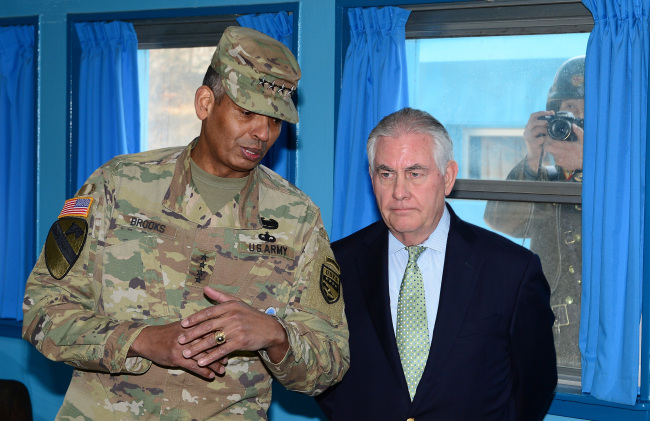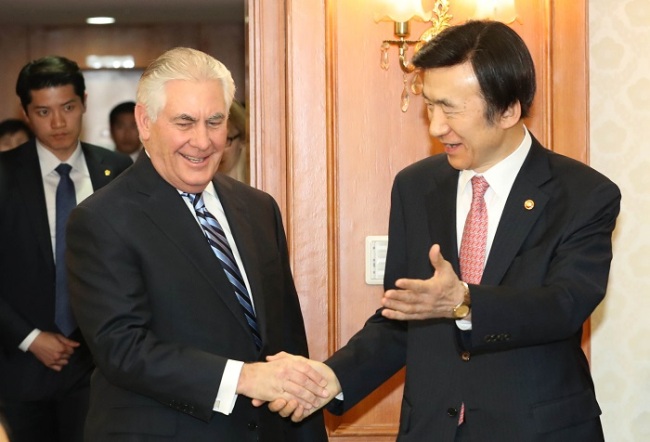Yun, Tillerson discuss THAAD, ‘new approach’ to NK
By Shin Hyon-heePublished : March 17, 2017 - 16:30
The foreign ministers of South Korea and the US held talks Friday as Washington calls for a “new approach” to North Korea and Seoul is taking heat from China’s economic retaliation over a plan to host a US missile shield here.

US Secretary of State Rex Tillerson arrived in Seoul, after a two-day stay in Tokyo where he met with Japanese Prime Minister Shinzo Abe and Foreign Minister Fumio Kishida.
Upon his landing at the Osan air base earlier in the day, Tillerson took a tour around the Demilitarized Zone near the inter-Korean border before visiting acting President Hwang Kyo-ahn and meeting with Foreign Minister Yun Byung-se.
During the ministerial consultations, the sides traded views on ways to facilitate coordination under the Donald Trump administration, which is currently carrying out a North Korea policy review.
They were likely to build on their previous first gathering last month in Germany to boost the two countries’ drive to ratchet up sanctions and pressure on the Kim Jong-un regime, possibly including secondary sanctions and cooperation with Beijing.

Tillerson said Thursday that his maiden Asia tour, which will take him to Beijing on Saturday, is partly aimed at exchanging views on a “different approach” to Pyongyang, saying 20 years of denuclearization-for-aid diplomacy has failed.
“I think it’s important to recognize that the diplomatic and other efforts of the past 20 years to bring North Korea to a point of denuclearization have failed,” the secretary said after talks with Kishida.
“That encouragement has been met with further development of nuclear capabilities and more missile launches,” he added, noting the US alone had provided $1.35 billion in assistance to the communist state as an “encouragement to take a different pathway.”
The ministers are also expected to have discussed joint responses to China’s unabated retaliation over Seoul’s plan to house the US’ Terminal High Altitude Area Defense system, throughout sectors from trade and retail to culture and tourism.
With Trump and Chinese President Xi Jinping slated for a summit next month in Washington, Yun may have called for Tillerson to convey a clear message to Beijing against its economic backlash.
“Obviously we need to send a stern message to China but are still working on its format,” a Foreign Ministry official here said, requesting anonymity due to the sensitivity of the matter.
Tillerson, for his part, would seek to play a mediator role between South Korea and Japan given their persistent historic tension. The Abe government has called in home its ambassador to Seoul in protest against a new girl statue raised near the Japanese consulate-general in Busan to honor Korean women who were forced into frontline sex slavery during the 1910-45 colonial rule.
The secretary expressed support for the two countries’ December 2014 agreement on the sex slavery rows, which prompted stringent resistance from the victims and the public here, calling for a “rapid conclusion.” Less than two months ahead of a presidential election, leading contenders have pledged to upend or renegotiate the deal.
“We encourage both sides to approach that agreement in earnest and sincere efforts to bring this to a conclusion,” Tillerson said.
Meanwhile, his shortened diplomatic consultations and public events in Seoul spawned a flurry of speculation given a leadership vacuum and political uncertainties.
The joint news conference aside, Tillerson spent almost two 1/2 hours with Kishida including a dinner and another one hour with Abe. But his meetings with Yun and Hwang were confined to about an hour 1/2, respectively, without any lunch or dinner gathering. Seoul officials said the US side opted not to have a meal together, citing the secretary’s “fatigue.”
By Shin Hyon-hee (heeshin@heraldcorp.com)




![[Herald Interview] 'Amid aging population, Korea to invite more young professionals from overseas'](http://res.heraldm.com/phpwas/restmb_idxmake.php?idx=644&simg=/content/image/2024/04/24/20240424050844_0.jpg&u=20240424200058)












![[KH Explains] Korean shipbuilding stocks rally: Real growth or bubble?](http://res.heraldm.com/phpwas/restmb_idxmake.php?idx=652&simg=/content/image/2024/04/25/20240425050656_0.jpg&u=)

